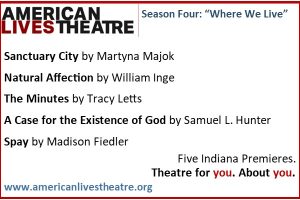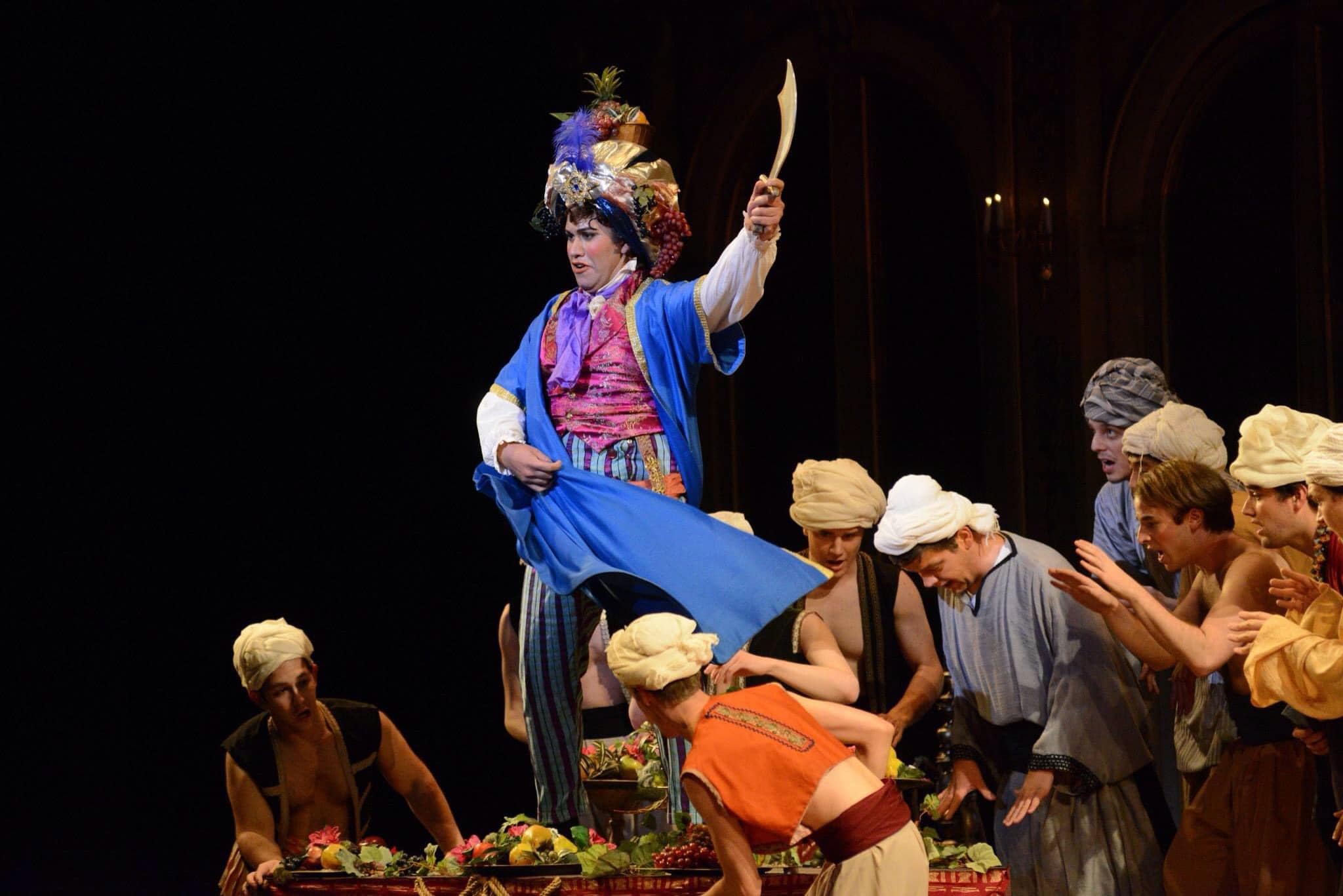
Bruno Sandes in L’italiana in Algeri – Courtesy of Bruno Sandes. Used with permission.
My love of exhilarating, free-spirited Brazilian music was sated when I attended the Indianapolis Symphonic Choir’s “Blue Indigo: Bossa Nova Edition” concert, led by Dr. Eric Stark, on Saturday, Oct. 14 at Schrott Center for the Arts at Butler University. For my review, look here to read how impressed I was with the program’s guest artists, including Brazilian American Bruno Sandes, a remarkable performer I felt compelled to profile.
Touted by critics for his “ability to engage deeply with any audience” and his “warm, refined, and mature voice.,” Sandes, earned his bachelor’s and master’s degrees from the Indiana University Jacobs School of Music and is currently in the final stages of his doctorate in Voice Performance under the tutelage of Carol Vaness.
Sandes has sung a vast and diverse number of operatic and musical theater roles, that include Figaro in “The Barber of Seville,” Giorgio Germont in “La Traviata”, Belcore in “L’Elisir d’Amore,” Don Giovanni and Leporello in “Don Giovanni,” Sergeant Sulpice in “La Fille du Regiment,” Ali Hakim in “Oklahoma!” and others.
Featured as a soloist in venues in the United States Europe, and South America, Sandes is a winner of many prestigious awards. He served as an Associate Instructor of Voice at Indiana University’s Jacobs School of Music and as the assistant director of both Carol Vaness’s and Heidi Grant Murphy’s Graduate Opera Workshops. Sandes is currently a professor of Voice at DePauw University and a staff singer of Christ Church Cathedral in Indianapois.
A few weeks ago, I had the opportunity to sit down with the warm and charismatic Sandes at Kaffiene Coffee, off Mass Ave., to chat about his flourishing career. Below is an edited transcript of our in-person conversation along with subsequent email communication.

Bruno Sandes – Courtesy of Bruno Sandes. Used with permission.
How special was the ISC Bossa nova concert?
To have more than 100 people on stage singing Bossa nova and singing in Portuguese was unique. Speaking as a Brazilian, it was impressive. The number of syncopated rhythms in Bossa nova is crazy. It is so easy to hear and has a relaxed vibe which highlights the text but singing it correctly is another thing altogether. The singers had such fun and enjoyed themselves. You could see it in how they were moving. Those going on tour to Brazil with the ISO next season, will understand and appreciate more about the country.
What are your music influences?
As someone who grew up in Brazil, I was lucky to be exposed to many different styles of music. Music is such an important element in Brazilian culture. Obviously, mostly Bossa nova and what they call “MPB, “Brazilian Popular Music”, a genre of music that blends poetry, popular rhythms, and other musical influences. Besides that, my mother took me to many choral and orchestral performances, where I fell in love with classical music. I also heard my grandfather – an amateur singer— singing all the old-style hits from the radio (songs from the 40’s, 50’s and 60’s. I was also a member of a very traditional church in Brazil where they would only play very traditional hymns, accompanied by strings, wind instruments, and organ. That’s where I studied music theory, and solfège, and even started playing the cello. But singing was my biggest passion. I also had albums by “The Three Tenors”, and Andrea Bocelli. Back then, they were the closest I could get to classical singing. Brazil unfortunately is not known for operas, and being an opera singer is almost a wild dream in a place like the one I grew up in, one of the smallest and poorest states in the whole country. But against all odds, here I am.
Who are your influences in general?
I have so many, I believe we can always learn, admire, and take notes from artists from different periods and styles. I love the artistic trajectory of Carmen Miranda, the artistry and musicality of Frank Sinatra, Tony Bennett, Elvis Presley, and Cole Porter. In the classical world, I really appreciate the work of Thomas Hampson, Christian Geharher, Lucas Meachem, Bryn Terfel, among many others. Of course, their voices are a big reason why I love those performers, but mostly because of the way they were/can deliver a message through music, how they approach music, the lyrics, and their connection with the audience.
What makes opera the beloved art form it is?
Opera encompasses and incorporates several of the performing arts within it, including theater/ acting, music, visual arts, scenery, costume, and drama and sometimes ballet, where the voices and orchestral arrangements carry the action and tell the story to the audience. Opera is also known as the art form where one can hear vocal acrobatics and vocal endurance at its best. Where else can someone be fatally stabbed and still sing extremely hard and ornate cadenzas for over 30 minutes while dying?
Is opera relevant?
Like other art forms, opera is currently having to reinvent itself. Besides all the traditional and beloved titles of the operatic repertoire, such as La Traviata, and Don Giovanni, we also have many contemporary composers who are working on bringing more contemporary themes and adapting them as operatic works for the stage. Works such as “Dead Man Walking”, the book by Sister Helen Prejean turned into movie two decades ago, can now be also seen and heard as a very emotional and touching opera. “Fire Shut Up in my Bones”, “Nixon in China”, “Champion”, “Girls of the Golden West”, and “Frida” are other examples of new operas.
Opera is relevant because it brings and keeps a tradition from the 16th alive. It still touches those who listen and watch it; it can make people cry, laugh, and think. It unites the beauty of a full or small orchestra, with trained voices in the pursuit of telling a story.
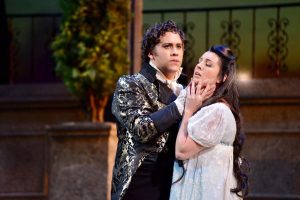
Bruno Sandes in Don Giovani – Courtesy of Bruno Sandes. Used with permission.
What makes live performance special?
The main element of live performances is the audience. I always look at live performances as a conversation between performers and the audience. I feel truly blessed and lucky to do what I do, because as performers we have the privilege of bringing those listening to us to our universe, to make them forget about the problems they may have outside the theater walls, to touch hearts and souls.
I always look at live performances as a unique opportunity to have a conversation with every and each person watching and listening to me, because we never know if that is indeed the last time we will be in a room with those people. The pandemic made that feeling even stronger.
How was it that you came to study at IU?
I was one of six singers from all over the world, chosen for a very famous classical music festival in Brazil. We took lessons and performed in concerts at location in the mountains close to Sao Paalo. A professor from IU’s Jacobs school of music was one of the instructors with whom I worked with and did concerts. The day before we left, he said “What are you doing here? I don’t think this is the place for you. I love this country, but you are talented, and you shouldn’t be here.” He told me that he was a teacher at one of the biggest opera programs in the world and said, “I think you should come and audition.” At the time I was finishing a degree in interior design. In Brazil it is hard to make a living as a classical singer. While I was doing interior design, I was also in competitions, so I decided to audition at I.U. I was the only foreigner to get a full ride as an undergrad which was unheard of. After six months I also sang in IU operas which is rare for the school I completed my undergrad, finished my master’s and then was encouraged to apply for your doctorate and there is no application fee, so I said why not it is a great place to be and I also had the freedom to travel and do concerts and I was accepted again so.
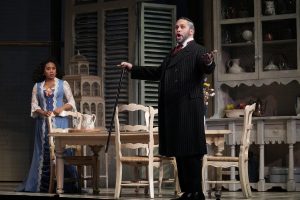
Bruno Sandes in La Traviata – Courtesy of Bruno Sandes. Used with permission.
Was it a difficult cultural adjustment relocating from Brazil to Indiana?
We assimilate so many things from American culture, pop culture, movies, etc. so there was not a huge shock. We are a very warm and touchy people. In Brazil you are greeted by a hug and at least 2 kisses. Here there is a handshake until you got to know others better.
How is that you chose to sing opera?
I had voice lessons and my teacher hated opera. However, she did like Italian operas and art songs. However, when I came to I.U to audition, a school known for its operas, I did not bring a single aria and brought only art songs. I had Maher, Schubert and an arrangement of “Shenandoah” because we needed something in English. It has become one of my favorite pieces. I never thought about opera but then it was suggested that I audition for it. I now hold a record for the number of roles I have sung for the ten years I have been at IU.
How does your training at IU stand up against programs at other schools?
IU is very strong. They look at IU as a company and the best are on stage. I was onstage as an undergrad after six months, but I was an exception. I know exceptional singers who have had fantastic careers and while at IU, they only sang two roles. I sang 17. I feel blessed that they love what I do on stage and that they trust me. They know I will be prepared. They know how hard I work at languages. I have done operas in six different languages on that stage.
What are some of your favorite roles?
Dramatically speaking there is Don Giovani in “Don Giovani and Germont in “La Traviata,”” So much to unpeel in Don Giovani. In musical theatre it would be Neil De Beque in “South Pacific” because the whole show is so touching and moving as are its tunes. Singing “This Nearly was Mine.” I thought the director would have me move about the stage. hut he wanted me to just stand in place and look out. “For that song, all I want from you is just to deliver the message. They lyrics are strong and powerful enough.” he said. Ultimately, I was very involved with the song.
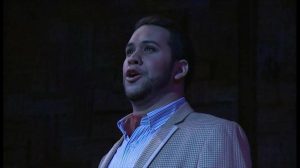
Bruno Sandes in South Pacific – Courtesy of Bruno Sandes. Used with permisssion.
What are your goals?
I have colleagues who say, “My goal is to sing at the MET.” I don’t have a goal like that because, what happens when you reach that goal? I was informed about an ISC singer who found out she had brain cancer. It was terminal, yet she was singing and laughing the entire time while in rehearsal. My goal as a performer is to have a conversation with the audience each time I perform. I never take it for granted that I have the power to help people forget about their problems. I love teaching and love my students but there is something special about sharing with an audience. I lost a lot of people, young and old in Brazil during the pandemic. I do not take life for granted.
What makes teaching special?
Just like performing, teaching is truly such a special activity. One of my favorite Brazilian poets, Cora Coralina, stated that “happy is the one who passes on what he knows, and learns from what he teaches”. We are all constantly learning. Life-long learners. And teaching for me is an exchange, exchange of knowledge, and an exchange of experiences. I have learned so much from teaching my students. Teaching voice/ singing is also such a particular task, because besides all the technical work involved (working on respiratory muscles to create and sustain a healthy tone, diction, rhythm, and so on), the process of singing is highly self-exploratory. One needs to apply concepts and translate them into their bodies, exploring sensations and ideas, transforming imagery into sound. And that’s a daily exercise, and it also changes with age and the maturing of the instrument (voice). There is truly something magical about watching a student improve. Watch vocal challenges disappear, and at the end of the day, make great music, help creating sensitive musicians and performers, and to know that you are somehow responsible for helping those students to become better versions of themselves and their crafts.
What is your advice to young people pursuing a career in opera.
As someone who came from a place where “opera” and/ or being an opera singer sounded like a very distant and almost non-attainable dream, all I can say is to never give up on doing and pursuing what makes your heart happy. I know it can be a very difficult path but keep on going. Be curious. Never stop learning and exploring. Be open to explore other genres. Grab every opportunity you are offered and give the best in you. “Put your own stamp and mark” in everything you do. Never take the opportunity of performing for granted. You never know who in the audience needs your artistry. You never know whose life can be changed by what you have to offer.




